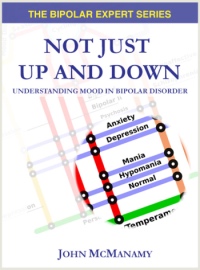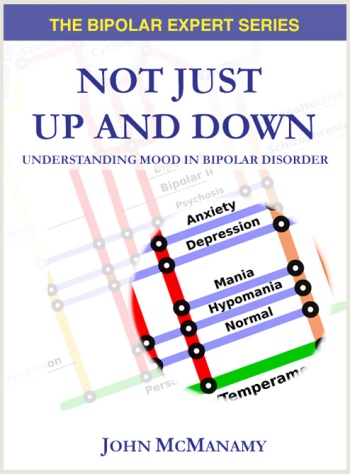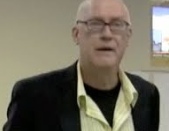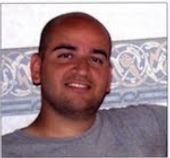Hard Depression, Soft Bipolar
 |
Still depressed? Maybe you're being treated for the wrong illness.
|
Mood Spectrum. Jim Phelps MD is an Oregon psychiatrist in private practice The name of his 2006 book is "Why Am I Still Depressed?: Recognizing and Managing the Ups and Downs of Bipolar II and Soft Bipolar Disorder." A better title might have been, "Screw the DSM: Let’s Discuss What’s Really Going On."
"In the DSM mode of thinking," Dr Phelps tells us, "making an accurate diagnosis requires determining whether the patient with depression symptoms is unipolar or bipolar, whereas in the Mood Spectrum approach, we clinicians don’t ask what might be the most accurate label for you. Instead, we ask where might your symptoms lie on the Mood Spectrum. … Instead of saying yes or no as to whether you might have bipolar disorder [we] try to determine how much bipolarity you have."
My New Book!

Purchase now.
The diagnostic threshold for bipolar II is hypomania, but here’s the catch: Hypomania is often barely discernible, especially in a population that may spend 50 days depressed for every one day hypomanic. A walk on the wild side for some may be using real butter on their toast.
Dr Phelps cites Hagop Akiskal MD of the University of California at San Diego and other leading authorities in support of the proposition that there can be bipolar disorder without hypomania or mania, what some experts are calling "soft" bipolar disorder.
Basically, look at the nature of the depression. Short and frequent recurrent depressions (as opposed to chronic depression) are a potential giveaway. Rather than view these depressions as discrete episodes that come and go, it may be more helpful to see them as part of a cycle. So what if "up" is more like normal? We still have evidence of a roller coaster, albeit one of a subterranean variety.
Other indicators are depressions with atypical features (such as mood reactivity), and postpartum and psychotic depressions. A first degree relative with bipolar disorder is also a good sign.
Are We Really Talking About Recurrent Depression Instead?
Frederick Goodwin MD, co-author of the definitive book on bipolar disorder, is inclined to classify these soft bipolar cases as depression, but not in the ordinary sense. The DSM distinction between unipolar and bipolar, in his words, "turned Kraepelin on his head."
Emil Kraepelin is the legendary diagnostician who first coined the term manic depression (not to be confused with the term bipolar disorder). In Kraepelin's system, Dr Goodwin explained to this writer, "affective disorders were divided into the highly recurrent and the less recurrent or non-recurrent forms."
So what Kraepelin meant by manic depressive illness was "recurrent affective disorder." There was no distinction between "uni" and "bi." It was more useful, instead, to conceive of one's illness as occupying part of a continuous spectrum.
But this is not the same as saying all depressions are alike, much less to be treated the same. All the research groups that did the original work on unipolar-bipolar differences were working with recurrent patients. This included Dr Goodwin and his colleagues, who, in a seminal 1976 study, teased out a group of patients with characteristics they defined as "bipolar II."
Dr Goodwin used bipolar II to distinguish this form of mood disorder from unipolar disorder and bipolar I. Nevertheless, in all cases it was understood by all concerned that they were dealing with various types of recurrent depression. The original meaning of unipolar, says Dr Goodwin, "was one form of recurrent affective disorder."
Later investigators separated manic depressive disorder into unipolar and bipolar, based on the presence or absence of mania or hypomania. But, as Dr Goodwin explains:
Once the DSM separated bipolar disorder out from the beginning, it left unipolar as a relatively meaningless term - that is, everything that's not bipolar. The DSM-IV residual category of "recurrent unipolar" is not much help because all that means is more than one episode.
One of the implications of abandoning Kraepelin, according to Dr Goodwin, is "that my friend Hagop Akiskal is more or less forced to put the highly recurrent unipolar patients in the 'bipolar spectrum' even though they are not bipolar. Given the DSM-IV, that seems to be the only way to emphasize their close relationship to bipolar disorder (family history of mania, early age of onset, multiple episodes)."
Focus on the Cycling
So we are talking about a group of patients with highly recurrent depressions, who may or may not have bipolar disorder but who have a lot in common with those who do.
The bottom line tends to be how these individuals react to antidepressants. An individual with highly recurrent depression or soft bipolar may run a similar risk of switching into mania or hypomania as one with more obvious bipolar symptoms. Or, as in the case with many bipolar patients, the antidepressant may poop out or have no clinical benefit whatsoever, even after three attempts on different antidepressants.
"By its very nature," Dr Phelps tells us, "bipolar disorder is a problem of cyclic changes in mood and energy." Therefore, Dr Phelps advises, focus on the long-term goal of stopping the cycling and "try to avoid treating your symptom du jour." The object is to keep depression from returning and not make the cycling worse.
It’s helpful to start, Dr Phelps advises, by being mindful of the stabilizing influences in our lives, such as adequate sleep, good social connections, proper diet, and exercise. Lord knows, we can count on a host of destabilizing influences to arrive on our doorsteps.
It may be best to ride out a depression, if possible, Dr Phelps suggests, rather than try an antidepressant. Bipolar depressions tend to be of shorter duration, so once the depression resolves, meds strategies can concentrate on keeping depressions from returning. Mood stabilizers are the treatment of choice, some with demonstrated efficacy in preventing relapse into a depressive episode.
Intriguingly, Dr Goodwin notes: "It's quite revealing to look at the old lithium data; it's as effective in the prevention of highly recurrent unipolar as it is in bipolar; so this particular mood stabilizer should be viewed as an anti-cyclic agent, not just an antibipolar agent."
For those with bipolar (and highly recurrent) depressions, antidepressants need to be regarded with suspicion, as these meds tend to treat the symptom at the expense of the cycle. Switches into mania and hypomania are common. Ironically, Dr Phelps maintains, antidepressants may result in more depression. This is because antidepressants, as well as causing cycling, may shorten the intervals between cycles.
Psychotherapy is also crucial. These include cognitive-behavioral therapy and interpersonal therapy. Dr Phelps also urges "prodrome detection," which involves being acutely attuned to early warning signs of an impending episode, and "social rhythm therapy" for normalizing sleep.
The Catch
"Why Am I Still Depressed?" is written in deceptively simple language, so much so that patients are likely to assume that the nuances of the mood spectrum are old hat to their psychiatrists. A patient could also be forgiven for thinking that the people to whom we entrust our lives take to heart every word spoken by Dr Goodwin - far and away the world's foremost authority on mood disorders - and apply his insights to their practices.
Unfortunately, this is a case where patients may be more informed than their psychiatrists. Despite being a hot topic of discussion among the experts for decades, the word is only just starting to filter down to the people who write our prescriptions. Accordingly, your treatment success may be riding on your skill in educating those who treat you. Please do not hesitate to give your psychiatrist your best "polite but firm" face as you present the book as a gift.
See also The Mood Spectrum and Multipolar Depression.
May 12, 2006, reviewed Jan 3, 2010
 |
More articles on mood. |




